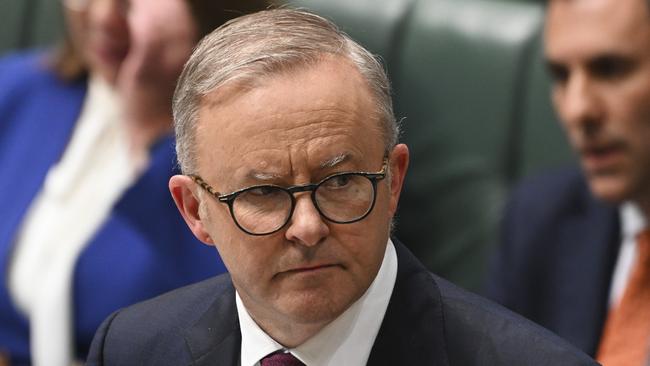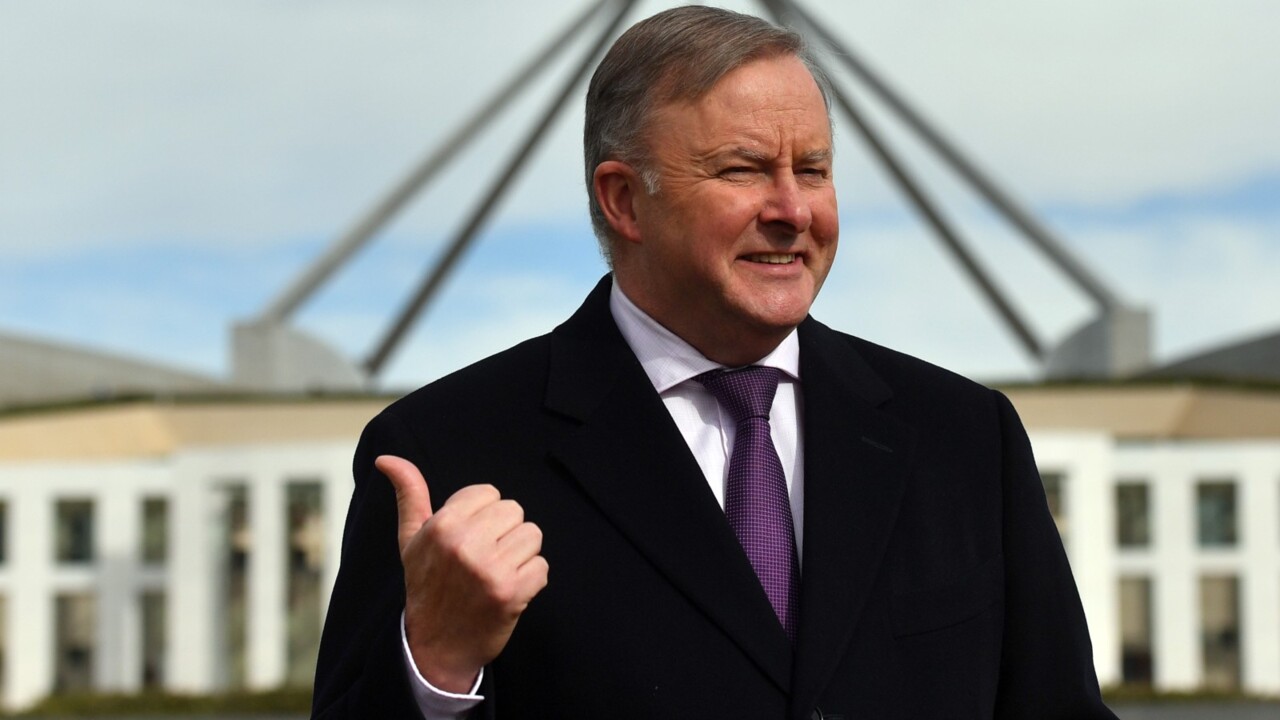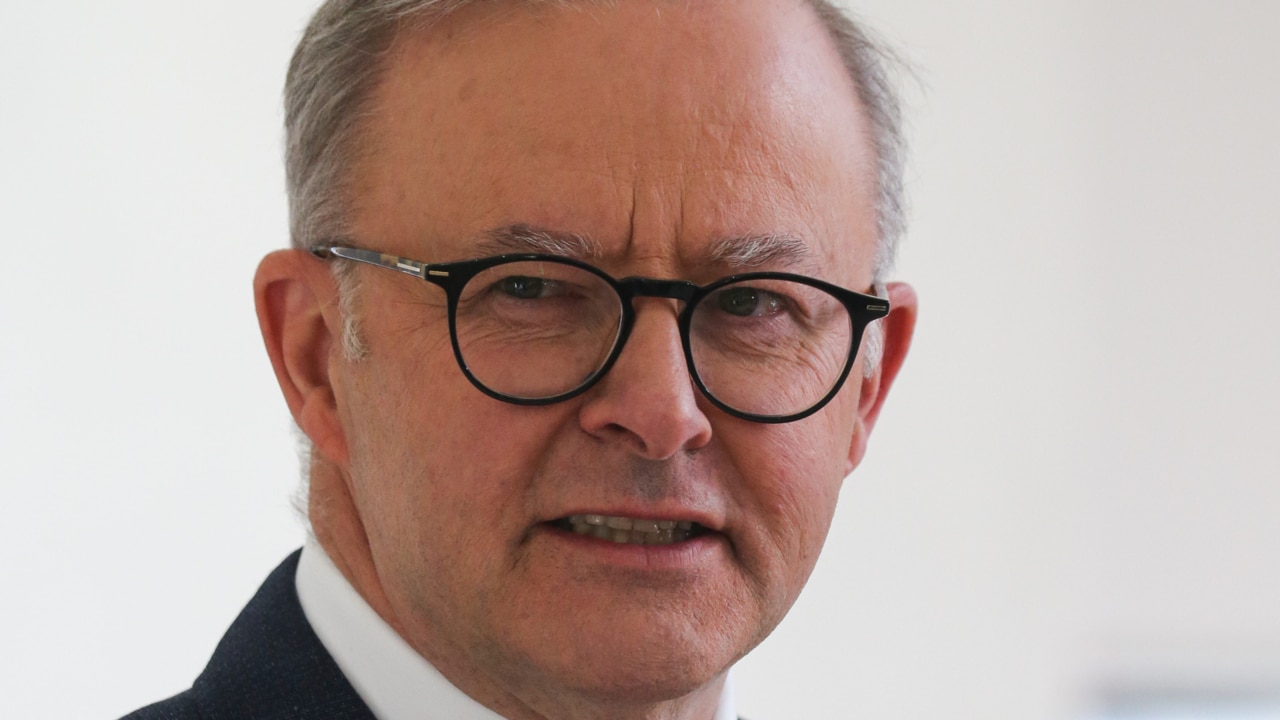Delayed national cabinet meets Friday over power plan after Anthony Albanese catches Covid
The critical meeting to finalise a plan on soaring energy prices, postponed after Anthony Albanese tested positive for COVID-19, will be held virtually.

National cabinet will be reconvened to meet virtually on Friday to map out a plan to tackle soaring energy prices.
The critical meeting was due to be held Wednesday until Anthony Albanese was forced to delay it after contracting COVID-19.
The Prime Minister’s office has confirmed that premiers, chief ministers and the prime minister would now hold the meeting virtually on Friday.
Mr Albanese tested positive for Covid-19 late on Monday and was forced into isolation at Kirribilli House.
A formal proposal from the Prime Minister to the states on controversial price caps for coal and gas, expected to be provided to the premiers late on Monday, has also been pushed back.
Mr Albanese sought to turn the blowtorch back on the premiers over the energy price crisis as the political stoush escalated, and he warned manufacturers would go out of business if they didn’t act.
But his office confirmed on Monday night that the national cabinet meeting had been delayed due to Mr Albanese’s second positive Covid-19 result that was detected during a routine PCR test.
The states are yet to formally hear from Canberra on how a price cap would work or whether the federal government would provide financial compensation for suppliers or forgone state government royalties.
Mr Albanese was due to hold a federal cabinet meeting in Perth later this week following a tour of the state. It was unclear whether this had also been cancelled.
The Prime Minister, under pressure to meet a Christmas deadline for his plan to arrest rising energy prices, accused suppliers of reaping “untenable” super profits and risking the viability of Australian manufacturing.
It comes as initial estimates provided to the NSW government suggest the price for coal would have to be effectively halved to between $125 and $160 a tonne under a coal price cap, if there were to be any flow-on effect on energy prices for consumers.

“We’ve said that we will act and we will act before Christmas,” Mr Albanese said.
“And I don’t think that there is a premier or chief minister who will sit back and say, ‘Yep, this is all OK’, for prices to continue to rise and projections which are there.”
The Australian has confirmed that federal government officials told state counterparts over the weekend that the commonwealth wouldn’t act on gas prices unless the states imposed complimentary price caps on coal.
However, by Monday night the NSW government had not received a detailed federal proposal on a coal price cap or any early indications of how much if any financial compensation Canberra would provide.
The federal government is poised to impose a mandatory code of conduct on gas suppliers that would include an explicit domestic price signal and which would have to be legislated within the next few weeks.
Mining companies were spooked that the federal government might revert to a windfall tax on profits to fund energy price relief for businesses and households should talks with the premiers on Wednesday fail to reach an agreement on a mechanism to help reduce power price rises. Senior federal government sources said this option was no longer on the table.
Mr Albanese said it was “untenable” for suppliers to continue to rake in super profits while businesses were being put at risk of collapse due to the rising energy prices. “What we know, and the premiers know this as well, is that unless we act there will be a considerable increase in the cost of power for both individuals, for households, but also for businesses,” he said on Monday.
“And I don’t want manufacturers to go out of business.

“Now they rely upon gas and it’s important that the price of gas is reasonable, that people can make a profit. But the idea that you have super profits being made at the same time as businesses are going out of business that provide long-term jobs in the manufacturing sector is, quite frankly, just not tenable.”
NSW Premier Dominic Perrottet confirmed he had spoken with Mr Albanese on Sunday, saying he was willing to engage, but had received a formal proposal.
“My position has been incredibly clear; we want to work with the commonwealth government to put downward pressure on energy prices,” he said.
“Now, at the same time though, if there is a situation where caps are in place that leads to compensation, then I don’t want to see the NSW taxpayers having to foot that bill.”
Queensland Premier Annastacia Palaszczuk remained defiant, with a loss of dividends from the state-owned coal-fired power generators at stake, saying she would have to be “very convinced that no Queensland would be worse off.”
“As I said very clearly we’ve set down our parameters. Millions of Queenslanders own our assets. Some of those profits are going back to Queenslanders in terms of direct assistance for our households,” the Premier said on Monday.
“There would have to be adequate compensation … we would have to be very, very convinced that no Queenslander would be worse off.”
The Australian has revealed that households and small businesses would be unlikely to see lower electricity bills until at least the middle of next year even if an agreement was reached with the states this week.
The code of conduct is expected to include new regulations targeting the profits of domestic gas sales, which will effectively cap prices under a floating mechanism that takes into account the cost of production and rates of return.




To join the conversation, please log in. Don't have an account? Register
Join the conversation, you are commenting as Logout